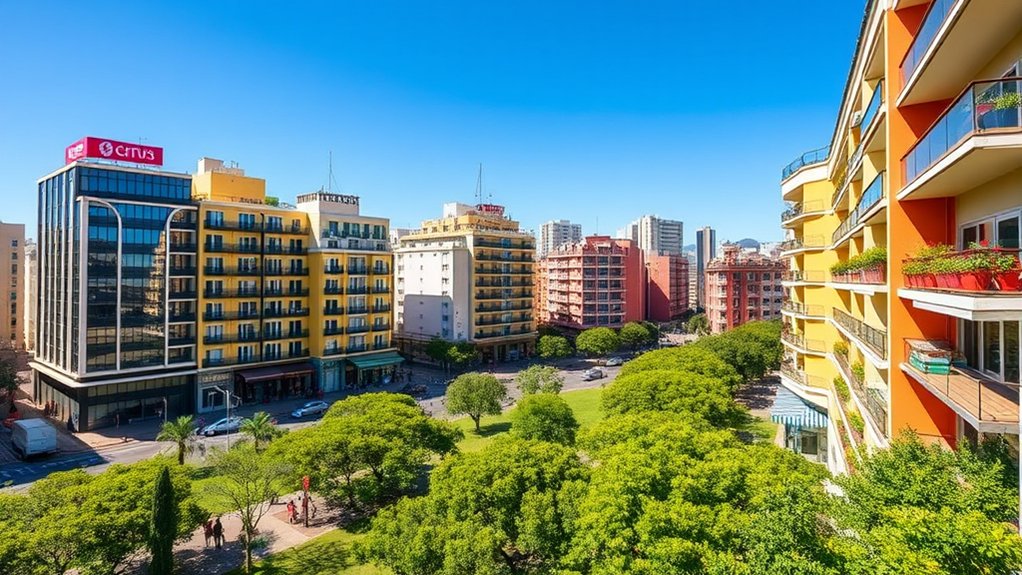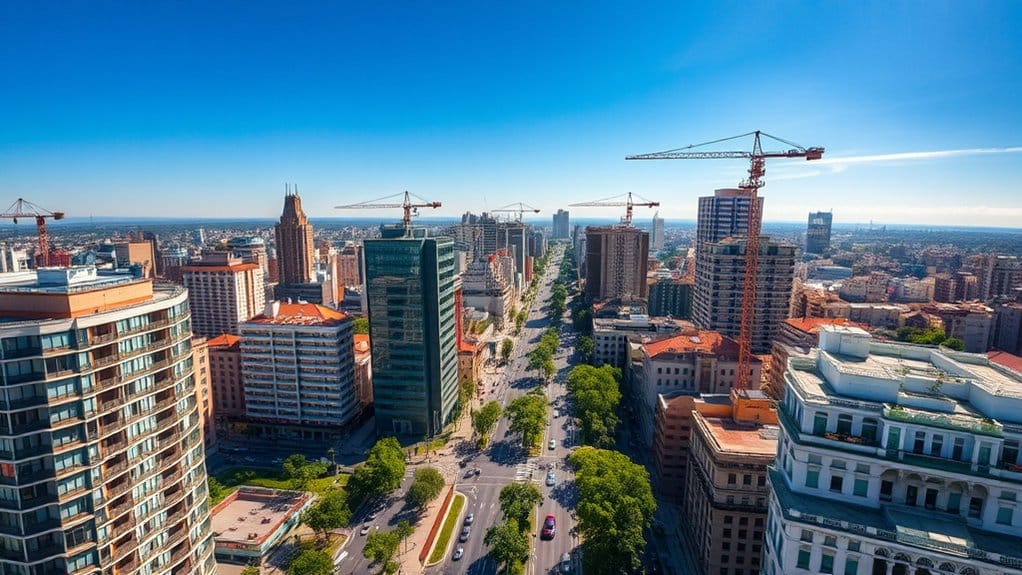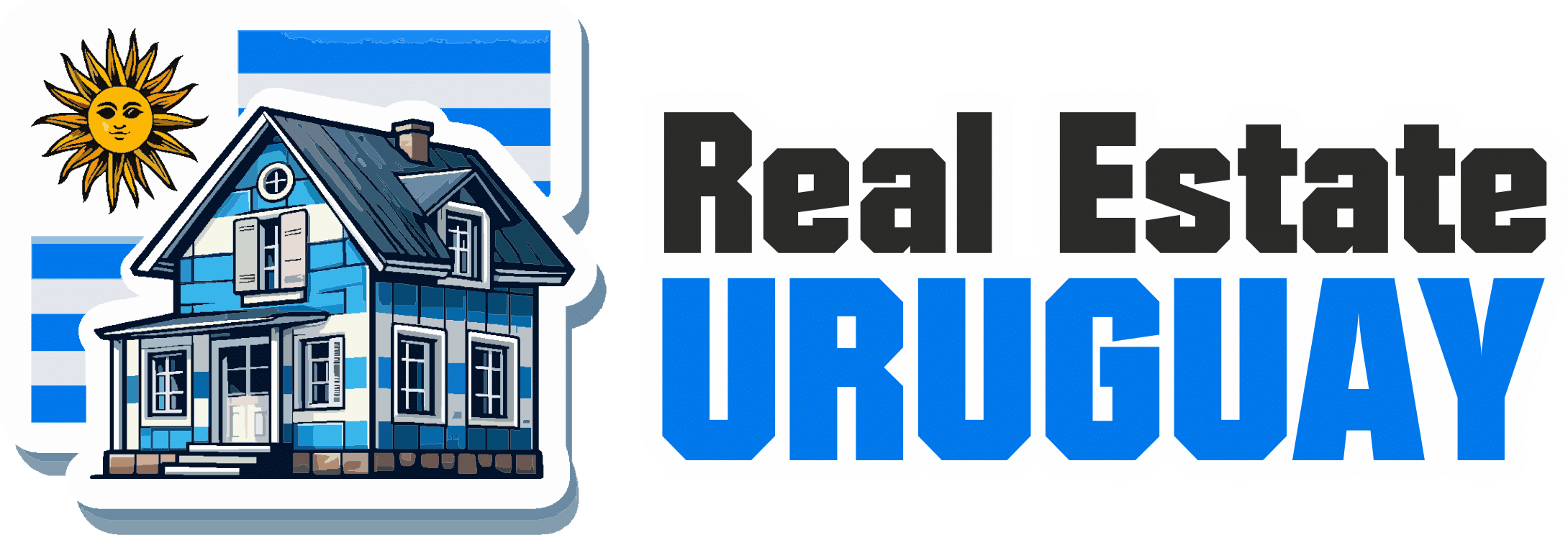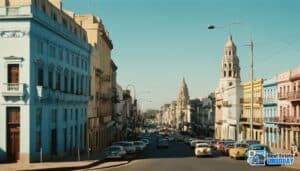Uruguay’s city apartments are in high demand, driven by economic stability, foreign investment. Prices average $2,420 per square meter, with new construction surging, rental sector booming, particularly on Airbnb, leaving many wondering what’s next.
Key Takeaways
- Average price per square meter is $2,420.
- Upscale neighborhoods range from $7,472.20 to $14,864.36.
- Montevideo leads residential property sales.
- Economic growth drives demand and prices.
- Foreign investment alters the market landscape.
Price Trends and Projections

As the Uruguayan real estate market continues to evolve, price trends and projections are becoming increasingly important for investors and buyers, particularly in cities like Montevideo, where average prices per square meter are around $2,420, although prices can vary significantly, ranging from $7,472.20 to $14,864.36 $U per square meter in upscale neighborhoods like Pocitos and Punta Carretas. Price fluctuations, driven by demand, are evident in neighborhood comparisons, with some areas seeing moderate increases, while others remain stable, ultimately influencing investment decisions, and shaping the market’s future, with freedom to choose being a key factor. The current state of the market is characterized by stable economic conditions, which contribute to its attractiveness for both local and foreign investors, with the construction sector experiencing significant growth and employing a substantial number of people.
Rental Market Overview
The rental market in Uruguay’s cities, particularly Montevideo, is a complicated, multifaceted entity, driven by various factors, including demand, location, and legal frameworks, which ultimately influence rental yields and returns. Rental demand drives lease agreements, with tenants seeking freedom in contract terms. The current trends in the rental market are also influenced by the country’s economic growth, with a projected GDP growth rate impacting the overall demand for rental properties.
| Factor | Impact |
|---|---|
| Location | Yields vary |
| Demand | Drives prices |
| Lease type | Affects rent |
| Market trends | Influences yields |
| Legal frameworks | Governs agreements |
Demand and Transaction Analysis

Analyzing market trends, sales data, and demand numbers is vital to understanding the dynamics of city apartments in Uruguay, where escalating urbanization, desire for stability, and foreign demand are driving residential property sales. The latest sales data indicates a 3.9% increase in transaction volumes in the first half of 2024, with Montevideo leading the charge, and a notable increase in prices, particularly for newly built houses, which saw a 13.33% price jump. As experts predict continued strong demand, driven by factors such as economic growth, favorable investment climate, and limited supply in prime locations, it is essential to examine the current market trends, sales data, and demand numbers to grasp the intricacies of Uruguay’s city apartment market. The growth of the Uruguayan real estate market, with a projected value of US$295.30 billion by 2028, is expected to further boost the city’s apartment sales.
Market Trends
Driven by its vibrant urban life and opportunities, Montevideo is experiencing a significant surge in demand for residential properties, which, in turn, is fueling the need for housing, making the city a hot spot for property transactions, with urbanization playing an essential role in this trend. The demand for sustainable living options is rising, catering to individuals seeking an urban lifestyle. With a growing focus on eco-friendly homes, Montevideo’s real estate market is adapting, offering more sustainable living choices, thus, attracting buyers who value freedom and a high quality of life, amidst the city’s thriving urban environment. Uruguay’s property market is also expected to see a rise due to economic growth and its attractiveness to foreign investors, contributing to the increasing demand for city apartments.
Sales Data
Sales data indicates a intricate, often contradictory picture of Montevideo’s real estate market, where high demand and limited supply fuel price increases, yet adjusted for inflation, prices are actually decreasing, revealing significant disparities in the market. Effective sales strategies target buyer demographics, focusing on urban living. The real estate market in Montevideo features high prices, with specific dollar amounts for average prices per square meter available via Statista.
| Sales | Trends |
|---|---|
| High demand | Price increases |
| Limited supply | Decreasing prices |
| Urban living | Growing demand, driven by sales strategies, and buyer demographics seeking freedom. |
Demand Numbers
As the real estate market in Montevideo continues to evolve, it has become increasingly evident that demand numbers play an essential role in shaping the city’s residential environment, with trends indicating a significant surge in demand for properties, particularly in urban areas, where the appeal of vibrant city life and opportunities is drawing in buyers. Residential demand is driven by urban migration, as individuals seek freedom and opportunities. The city’s appeal attracts locals and newcomers, fueling a strong rental market, with rising yields and prices, and a forecasted vacancy rate of 5% by 2026, driven by high demand and urban migration. The market’s growth is also influenced by a stable economic environment, which contributes to the overall confidence of buyers and investors in the area.
Housing Finance Options

When considering housing finance options for city apartments in Uruguay, buyers must maneuver through various loan options, including mortgages, investment loans, and micro-loans, each with distinct requirements and benefits. Mortgage rates, in particular, are a vital factor, as they can significantly impact the overall cost of purchasing a property, with local banks offering rates that may vary depending on the borrower’s status as a resident or non-resident. The selection of a suitable loan option, therefore, requires careful evaluation of factors such as interest rates, loan terms, and repayment conditions, in order to secure a financing solution that aligns with the buyer’s financial situation and goals. Uruguay’s economic growth, combined with its political stability, makes it an attractive location for real estate investment, which in turn affects the demand for housing finance options.
Loan Options
Financing options for city apartments in Uruguay are numerous, but navigating them can be a complicated, frustrating process, requiring careful consideration of various factors, including loan terms, interest rates, and eligibility criteria. To secure a loan, individuals must assess loan eligibility, repayment options, and associated risks. Local banks offer mortgage options, but foreigners face strict requirements, while international banks provide specialized loans with larger down payments. Investors can investigate investment loans, mutual funds, and government programs, which offer subsidies and micro-loans, providing alternatives for those seeking freedom in their financial choices, and allowing them to make informed decisions. Understanding the mortgage process is crucial for making informed decisions about financing city apartments in Uruguay, as it directly impacts the overall cost of ownership and long-term financial stability.
Mortgage Rates
Mortgage rates in Uruguay, which are influenced by the overall economic conditions and housing market trends, currently stand at 11.9% according to World Bank data from 2023, and these rates can vary significantly based on the creditworthiness of borrowers and the objectives of financing, making it essential for investors to carefully assess their options.
- Variable interest rates
- Fixed mortgage types
- Interest calculation methods
- Risk-based pricing
Mortgage types, interest calculation, are vital factors in Uruguay’s housing finance options, offering freedom to choose, but requiring careful consideration. When evaluating these options, using a mortgage calculator can help determine the best course of action for potential homeowners.
Airbnb Market Performance
Numerous cities in Uruguay, particularly Montevideo and Punta del Este, have established themselves as significant players in the Airbnb market, boasting a substantial number of active listings, with over 5,800 combined, and a notable disparity in their respective focuses, as Montevideo’s listings are more urban-focused, while Punta del Este’s are predominantly tourist-oriented. Airbnb dynamics and occupancy trends indicate a strong market, with Montevideo having a 66% median occupancy rate, and Punta del Este at 46%, showcasing stable demand for short-term rentals, and offering investors a unique opportunity for flexible, profitable investments, with potential for high returns. The average daily rate is influenced by factors such as regulations and market size, making it essential for investors to analyze these key statistics before making a decision.
Economic and Regulatory Environment

Several factors contribute to Uruguay’s economic and regulatory environment, which is characterized by stability and growth, with the country’s economy projected to expand by 13.1% over the next five years, at an average GDP growth rate of 2.6% annually, creating a favorable climate for real estate investment. Key economic indicators include:
- Low inflation
- Increasing GDP per capita
- Stable interest rates
- Growing mortgage market. This investment climate offers freedom, supporting rising property values, and increased rental demand, making Uruguay an attractive destination for those seeking economic freedom and a stable investment climate. The country’s Foreign Investment policies also play a significant role in attracting investors from around the world to its thriving cities and towns.
Property Investment Opportunities
Uruguay’s real estate market is experiencing significant growth, with rising demand for residential and commercial properties, particularly in areas like Montevideo, Punta del Este, and Rocha, driven by urbanization, tourism, and foreign investment. The trends in this market are characterized by surging residential demand, strong rental yields, and increasing property prices, making it an attractive destination for investors seeking substantial returns, including those from vacation rentals and commercial properties. As the country’s infrastructure and development projects advance, with a focus on sustainability and modernization, investors can expect promising investment opportunities, with potential returns on residential and commercial properties, as well as innovative investment methods like pre-construction purchases and crowdfunding. The market’s growth is also supported by economic stability, which attracts more investors and homebuyers to the region.
Real Estate Trends
Most notably, a significant portion of the community, approximately 95.77%, resides in urban areas, driving a substantial demand for city apartments, and contributing to a pronounced shift in real estate trends. This shift is characterized by a preference for compact living, proximity to urban amenities. The stable economic growth and low inflation in Uruguay create a favorable environment for investment in city apartments, with consistent growth being a key factor. Key trends include:
- Compact living spaces
- Urban amenities
- Single-person households
- Affordability, driving the demand for city apartments, as individuals seek freedom, convenience, and efficiency in their living arrangements.
Investment Returns
As the demand for city apartments continues to drive real estate trends, investors are keenly focused on the potential returns on their investments, particularly in a market where, despite the challenges, opportunities for substantial gains are plentiful, given the right location and property type. Investors consider investment strategies, yield comparisons, to maximize returns. The country’s economic growth has also led to an increase in rental yields, making it an attractive option for investors.
| Location | Yield | Property Type |
|---|---|---|
| Pocitos | 5.73% | Studio |
| Cordón | 4.83% | 1-bedroom |
| Malvin | 8.04% | 3-bedroom |
| Punta del Este | 8% | Luxury |
| Maldonado | 8.82% | 3-bedroom |
Market Growth and Development

Economic momentum is driving the growth of city apartments in Uruguay, fueled by a combination of factors, including urbanization, changing demographics, and shifting lifestyles. Market challenges, such as high demand, are met with urban amenities, like improved public transportation. Key factors include:
- Urbanization trends
- Single-person households
- Suburban vs urban costs
- Convenience and accessibility, contributing to the surge in demand for urban housing, amid a backdrop of increasing freedom to choose city living. The city’s relatively low rental yields attract investors and homebuyers, adding to the market’s growth and development.
Urban Planning and Infrastructure
Urban planning and infrastructure development in Uruguay are being driven forward, despite facing numerous challenges, by an intricate framework of laws, strategies, and investments, which, while imperfect, demonstrate a clear commitment to creating more sustainable, livable cities. Uruguay’s urban infrastructure is focused on sustainable development, with investments in road networks, bridges, and urban interventions. The National Sustainable Cities Strategy aligns with global goals, promoting sustainable development, and improving urban infrastructure to support the productive sector, and connect with the railroad network, ultimately enhancing the quality of life for citizens, and fostering a more sustainable future. The country’s efforts in urban planning are also influenced by the principle of decentralization, which has led to the establishment of municipalities as local governments, allowing for more targeted and effective urban development initiatives.
Real Estate Purchase Transactions

Purchasing real estate in Uruguay is a complicated process, requiring meticulous attention to detail, careful negotiation, and a thorough understanding of the country’s unique laws and regulations. Real estate processes involve various steps, including making an offer, signing a preliminary sales contract, and verifying the title. Buyer obligations include finding a notary public, paying a deposit, and covering taxes. Key aspects of the process are:
- Making an offer
- Signing a Boleto de Reserva
- Verifying the title
- Signing the Escritura de Compraventa. Throughout these steps, buyers must maneuver intricate procedures to ensure a successful transaction. The country’s strong financial systems support the growth of the real estate market, making it an attractive option for investors.
Foreign Demand and Investment
A surge in foreign investment is altering Uruguay’s real estate scenery, driven by the country’s unique blend of political stability, robust regulatory frameworks, and attractive tax incentives, which collectively create a favorable environment for foreign buyers, allowing them to traverse the market with ease, and ultimately, invest in properties with confidence. Foreign buyer preferences, influenced by investment motivations, are shifting towards city apartments, driven by potential returns and stability. With a 15% increase in foreign investors since 2020, Uruguay’s transparency and low corruption levels are fueling demand, making it an attractive destination for those seeking freedom and investment opportunities. The growth of Uruguay’s real estate market is expected to exceed $260 billion by 2025, driven by macroeconomic factors that enhance investor confidence significantly.
Housing Affordability and Accessibility

Housing affordability and accessibility, a critical component of Uruguay’s real estate market, continues to pose significant challenges, driven by soaring property prices, particularly in coastal areas like Punta del Este and Montevideo, where beachfront properties can range from $200,000 to $20 million, and new homes average UYU 83,000 (US$2,199) per square meter, making it difficult for many individuals to afford. Key issues include:
- High property prices
- Limited housing accessibility
- Affordability challenges
- Increasing mortgage burdens, highlighting the need for solutions to address housing affordability and accessibility. The website for Uruguay’s real estate market provides a copyright notice that protects all content, which may be useful for individuals researching the market and its associated challenges.




11 Responses
$2,420 per square meter? Seriously? This is just another bubble waiting to burst.
The article says demand is rising, but what about people who can’t afford to buy? This is just pushing locals out!
‘Urbanization trends’? More like urbanization traps for those who can’t pay the bills.
$295.30 billion by 2028? Sounds like a lot of money being made off people’s desperation.
I don’t understand how anyone can afford these prices! $2,420 per square meter is outrageous!
Why does everyone think foreign investment is a good thing? It just drives up prices for everyone else!
‘Rental sector booming’? More like it’s becoming impossible for regular folks to find a place to live!
$7,472 in upscale neighborhoods? What do they expect people to do, live in boxes?
I don’t get why everyone is so excited about these prices. $2,420 per square meter sounds insane! How can regular people afford to live there? It feels like a bubble waiting to burst. We need affordable housing options, not just luxury apartments for investors!
I feel like this article ignores the real problem: the average person can’t keep up with these prices.
‘Freedom to choose’ sounds great, but only if you can afford to choose anything at all!